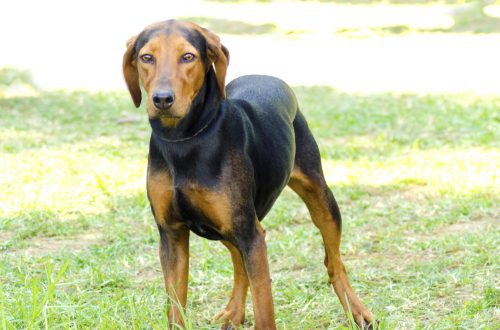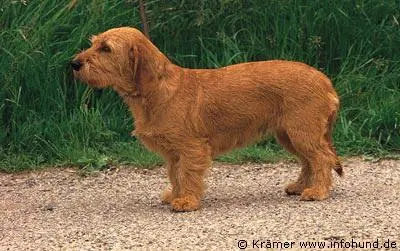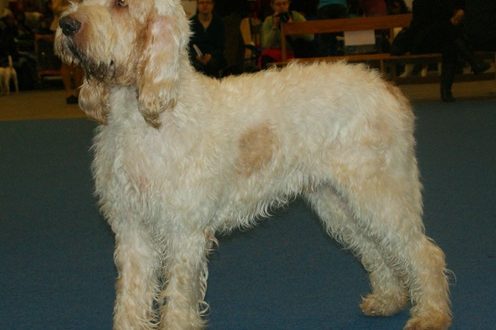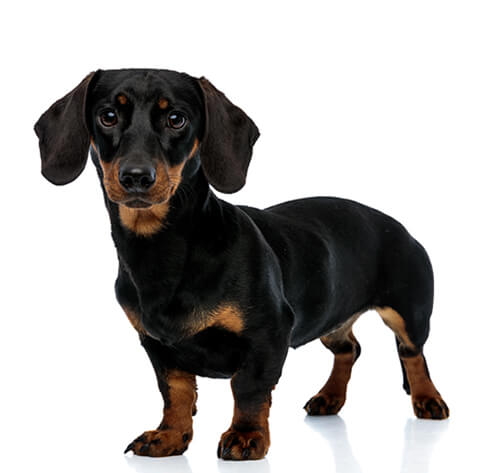
Dachshund
Dachshund is an example of an amazing contrast between an unremarkable appearance at first glance and the perfection of the inner content.
Contents
- Characteristics of Dachshund
- Basic moments
- History of the Dachshund breed
- Video: Dachshund
- Dachshund appearance
- Photo of an adult dachshund
- The nature of the dachshund
- Education and training
- Care and maintenance
- Dachshund health and disease
- How to choose a puppy
- Photo of dachshund puppies
- How much is the Dachshund
Characteristics of Dachshund
| Country of origin | Germany |
| The size | small |
| Growth | standard – 15-35 cm miniature – 14-21 cm |
| Weight | standard – up to 12 kg miniature – up to 6 kg |
| Age | up to 15 years |
| FCI breed group | dachshunds |
Basic moments
- Initially bred as an assistant for burrow hunting, the dachshund has retained the best properties inherent in its ancestors to this day – activity, intelligence, dexterity, fearlessness and independence. However, it is great for home keeping.
- The dog requires compliance with a number of rules: it cannot stand on its hind legs, jump from a height. These conventions are associated with the structural features of the animal’s body and are aimed at avoiding harmful effects on the spine and musculoskeletal system of the dog.
- Dachshund is a tireless dog that is infinitely devoted to its owner. Be prepared for the fact that you will have to reciprocate her feelings and devote a lot of time to communicating with your friend. If you are a very busy person or just tend to have a quiet philosophical pastime, this pet is not for you.
- A walk for a dachshund is always an adventure. Moreover, the dog does not try to turn off its hunting instinct. She is keenly interested in everything that only moves, so the best means of control during walks will be a tape measure leash. Without it, a dog in the heat of hunting excitement can go very far.
- Dachshunds are good with children. The main thing is to make sure that your household, in a fit of sincere delight and admiration, does not harm the puppy, because the little taxi, despite its desperately brave disposition, is still a very fragile creature. Representatives of the breed are friends even with cats, but they usually need time to establish relationships.
- Dachshunds are interested in everything, so items that can be potentially dangerous to the health of the dog (electrical wires, household chemicals, house plants) should be removed ahead of time in an inaccessible place. Small things that the puppy can inadvertently swallow, also put away.
- Dachshund is a big fan of food. But gaining excess weight is just something and it is impossible. The development of a balanced diet and adherence to a diet is one of the most important tasks.
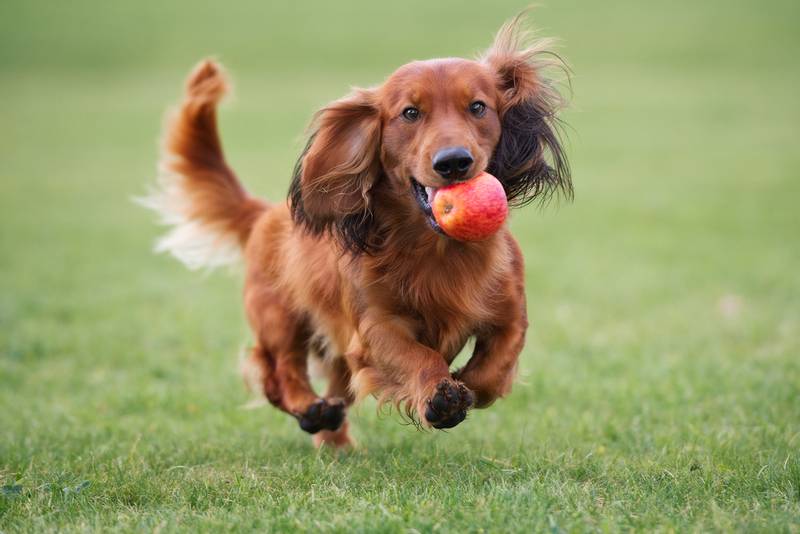
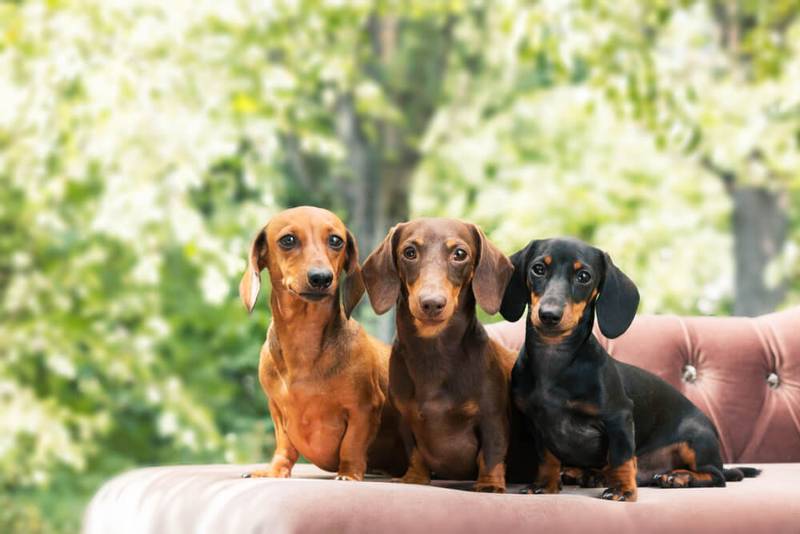
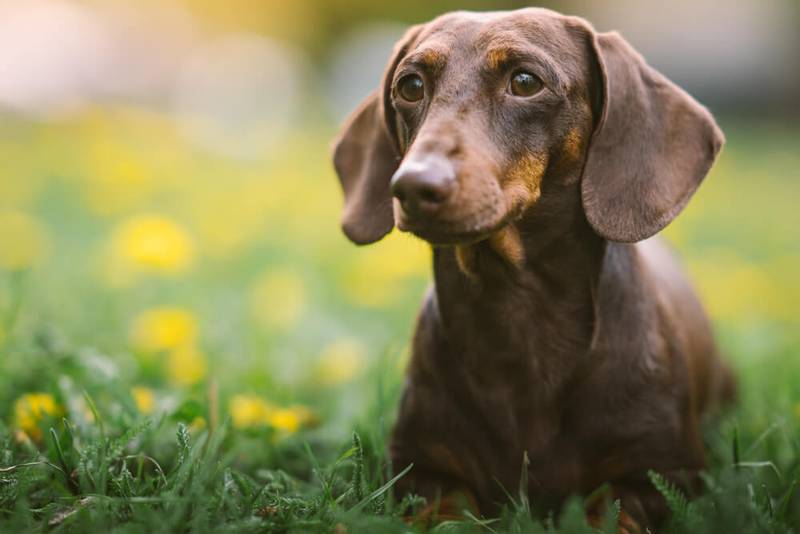
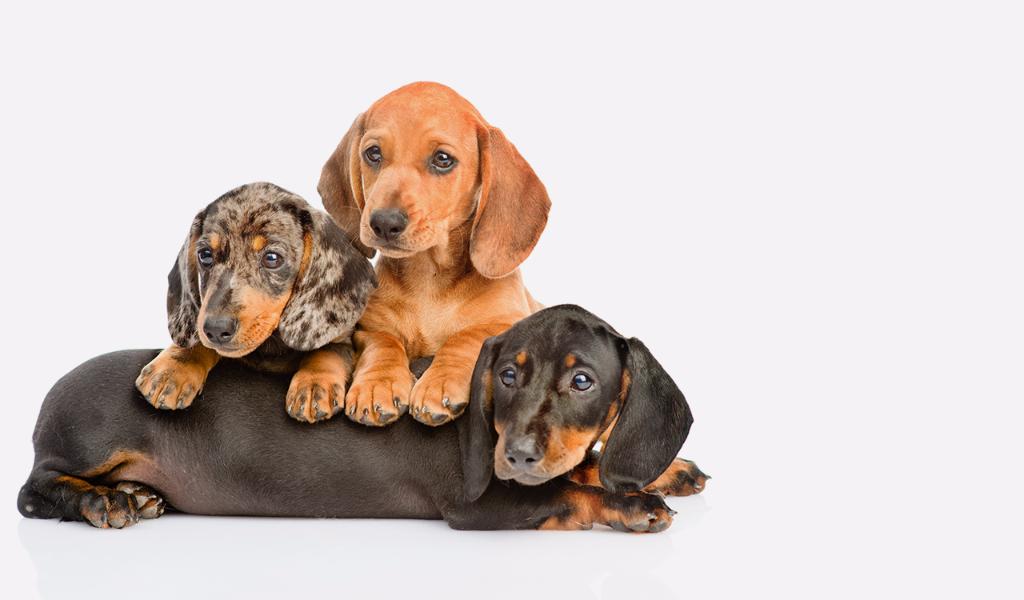
Dachshund is without exaggeration the most “charming and attractive” among a huge number of breeds. The charm of this dog allowed her to ignore the trends of capricious and changeable fashion, remaining for more than two centuries in the top lists in popularity. Among the loyal fans of the breed, you can meet both avid hunters and people who sincerely perceive the dachshund as an exclusively room dog. The main thing is that they all consider their pets the standard of canine intelligence, courage, devotion, love and beauty.
History of the Dachshund breed
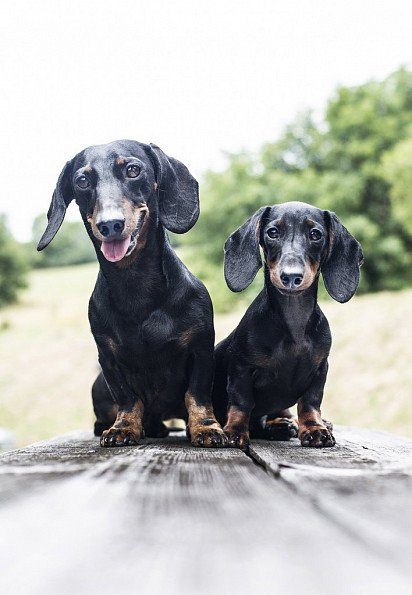
Dachshund is a hunting dog designed for burrow hunting, and in this segment it can rightfully be considered the oldest breed. Although dogs that look like dachshunds are found even in ancient Egyptian images, it is generally accepted that the modern phenotype began to form in the 16th century. The birthplace of the breed is the German land of South Saxony.
The main ancestors are the German short-legged Brakki hounds. Having retained all the best hunting qualities of the latter, the dachshund was able to turn their disadvantage – short limbs – into a big plus, and became an indispensable dog for burrow hunting.
German burghers, suffering from badger raids on agricultural land, quickly appreciated all the advantages of the dachshund. The breed did not give up its position even during the active development of cities in Germany, because it was convenient and not expensive to keep a dog.
Very energetic, intelligent and devoted, by the end of the 17th century, the dachshund was increasingly winning the hearts of the Germans. Active breeding of representatives of this breed began. The number of dachshunds increased very quickly, the first nurseries appeared in Germany, and soon the breed began to spread throughout Europe. A unified approach to the principles of breeding did not exist then. Each breeder solved the problem based on his personal ideas and preferences. As a result, two main directions in breeding gradually developed – working and decorative.
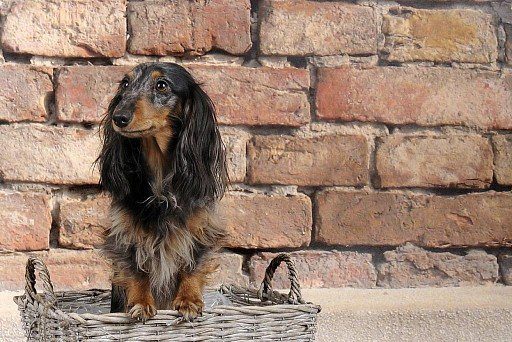
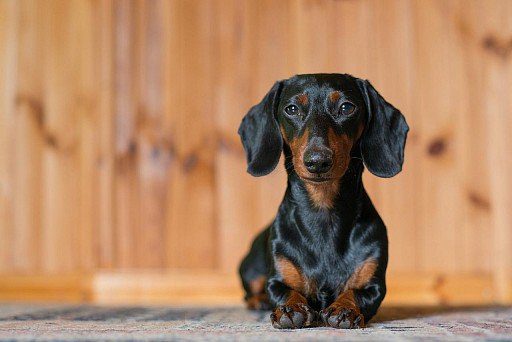
The logical conclusion of the breeding work was the adoption in 1870 of the first breed standard. The main purpose of breeding dachshunds was indicated for hunting. Ten years later, von Bosch designed an artificial burrow for training and training dachshunds, and since 1893 this structure has been used for working tests of dogs. The modern FCI classification distinguishes dachshunds into a separate group with the greatest variability – 9 varieties of the breed are officially recognized and standardized.
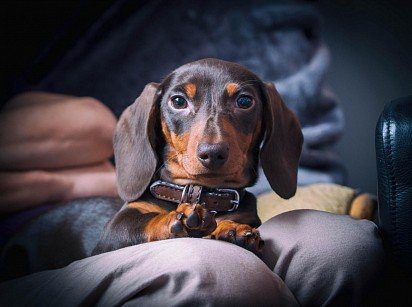
In Russia, the dachshund has been known since the middle of the 18th century, although the breed was not widely used at first. In 1900, the Russian Society of Fox Terriers and Dachshund Fans appeared, and from that time specialized exhibitions began to take place, stud books appeared.
The dachshund was gaining more and more popularity, although it was perceived by the inhabitants of our country more as a decorative dog. Among the famous owners of dachshunds can be called the great Russian actress Maria Ermolova, the writer A.P. Chekhov, who was very fond of his four-legged pets – Brom Isaich and Khina Markovna. Among foreign celebrities, one can recall a great admirer of dachshunds, oceanographer Jacques Yves Cousteau.
The bloody 20th century with its two world wars had an extremely negative impact on the livestock of the breed in Russia. At the exhibition in 1958, only 11 dogs were presented.
Fortunately, the situation was corrected. Today, the Dachshund is one of the most numerous and popular breeds in our country.
Video: Dachshund
Dachshund appearance
The main distinguishing feature of dogs of this breed is a long torso on short limbs. There is a division into varieties depending on the size and type of coat.
By size:
- standard rates. Male weight – 7-9 kg, females – at least 6.5 kg;
- small taxes. Male weight – up to 7 kg, females – up to 6.5 kg;
- rabbit dachshunds. Weight up to 4 and 3.5 kg, respectively.
The chest circumference in rabbits is up to 30 cm, small ones are 30-35 cm, standard ones are more than 35 cm.
Height at the withers – from 12 to 27 cm, depending on the variety.
Head
Graceful, rather dry, wedge-shaped. The skull is flat on top. The muzzle is slightly hook-nosed, long. The transition to it is not sharp, rather smoothed and smooth. The lips have a slight crease at the corners. The nose is large, brown or black, depending on the color of the animal.
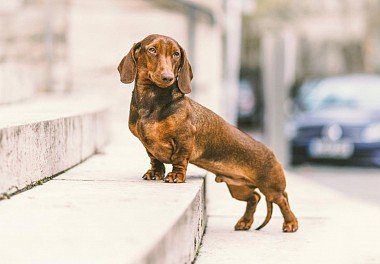
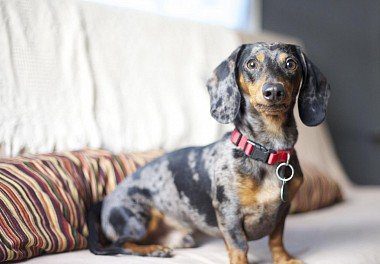
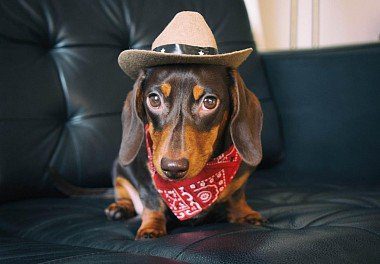
Teeth
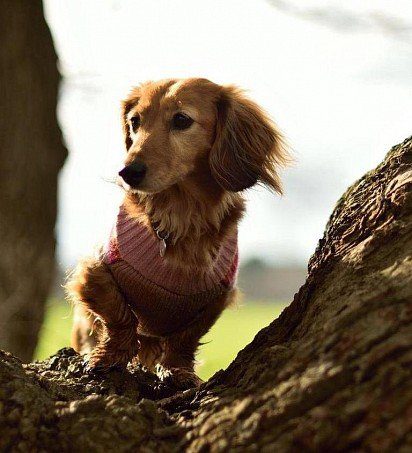
The teeth of the dachshund are large, powerful, in a complete set of 42 pieces. Scissor bite. Jaws are strong.
Ears
Dachshund’s ears are of medium length, hanging, rounded. Located close to the back of the head, high. The leading edge should touch the cheek.
Eyes
Oval, medium size. Set wide apart. Color – from reddish brown to dark brown. Whitish, blue eyes are allowed (although still undesirable) in marbled dachshunds.
Neck
Muscular, tall, rather long. The nape is slightly convex.
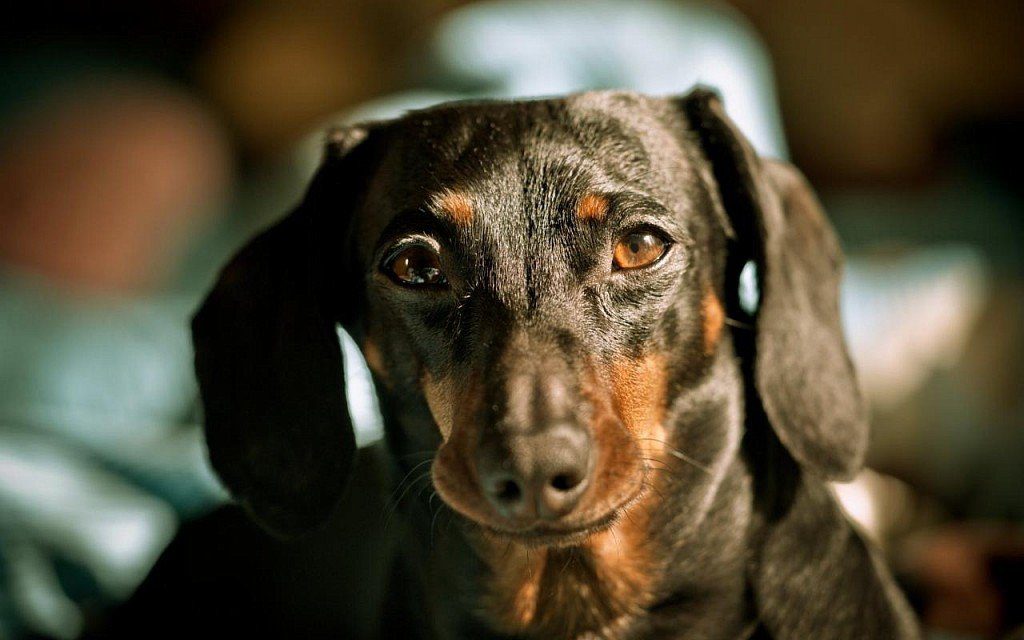
Frame
The line of the back is straight or slightly sloping towards the croup. The loin is long, with well-developed muscles. The chest is wide, with the sternum extended forward. The ribs are rounded, lowered to the middle of the forearm. The withers are well expressed. The abdomen is moderately tucked up.
limbs
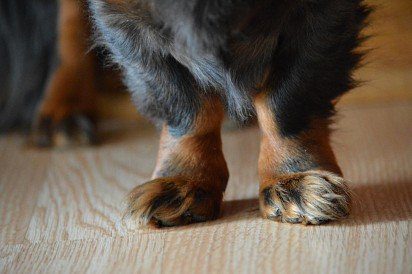
The forelegs are straight when viewed from the side. The forearms are short, located almost vertically. Elbows point straight back. The limbs are very muscular with strong bones. The paws are tight, arched, with well developed pads and strong strong claws.
The hind limbs of the dachshund are proportional in length to the front, muscular, with strong bones. placed in parallel. The angles of the knee and hock joints are well expressed. The paws are tight, standing firmly on well-developed healthy pads.
Tail
The tail of the dachshund is not set very high. Carried along the topline, moderate saber is possible.
Wool
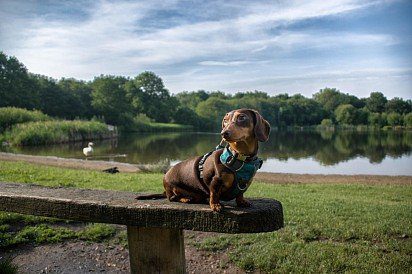
- Smooth-haired dachshund. The coat is short, thick, shiny, without the slightest sign of baldness. Adheres well to the skin. The touch is hard and dense. Hair length – up to 2 cm.
- Wirehaired Dachshund. Dense coat with undercoat, straight, close fitting on all parts of the body except for the ears, eyebrows and muzzle. The muzzle has a well-defined beard, bushy eyebrows. The hair on the ears is almost smooth and noticeably shorter than on the body. To the touch – hard. The length of the hair is on average about 3 cm.
- Long haired dachshund. Smooth, glossy coat with undercoat, lying well on the body. Forms a fringe on the ears. The feathering is well defined on the back of the legs. It reaches its greatest length on the underside of the tail.
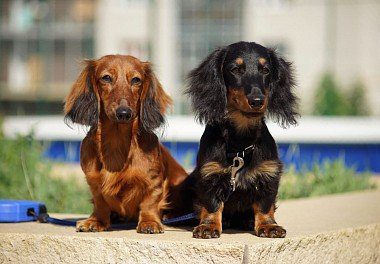
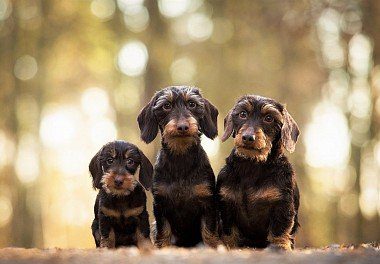
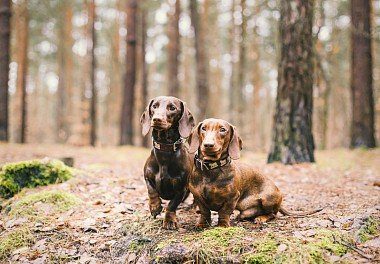
Color
Yellow-red and pure red in various shades, black, gray or brown with rusty-red or clear tan, marble of the listed colors. Wire-haired is characterized by a “boar” color from light to dark shades.
Any deviation from the above points is considered a defect or a disqualifying feature, depending on the severity.
A detailed list of defects, faults and disqualifying features is given in the description of the FCI breed standard, group 4, Dachshunds.
Photo of an adult dachshund
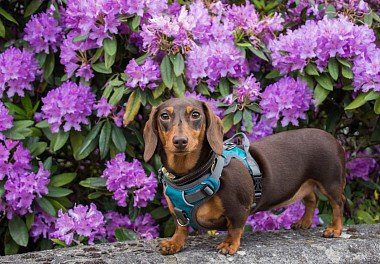
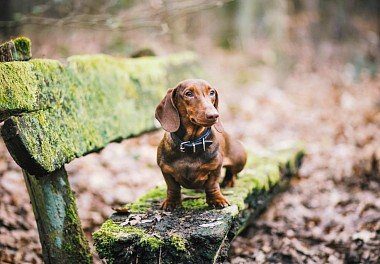
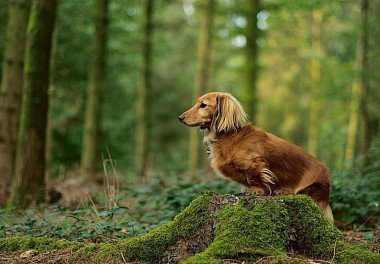
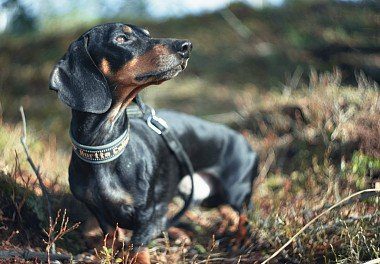
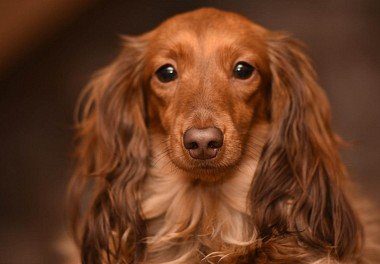
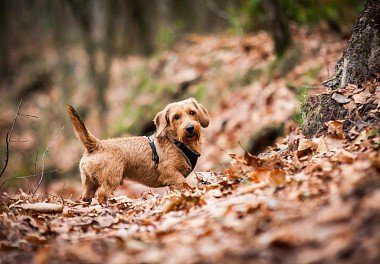
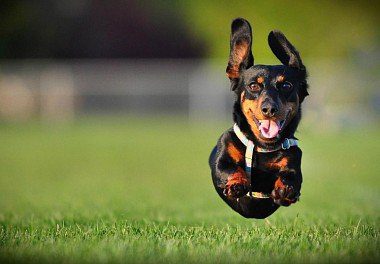
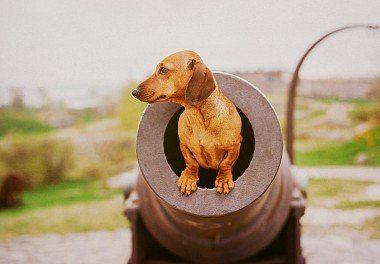
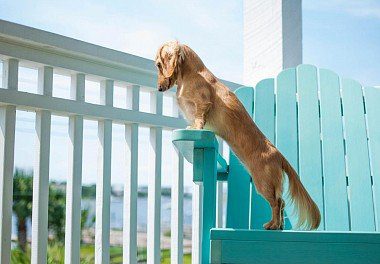
The nature of the dachshund
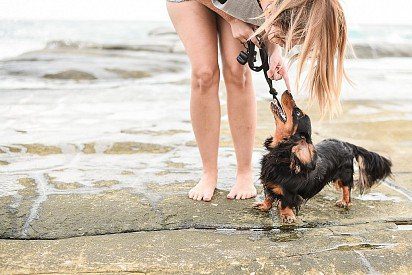
“With self-respect, with a strong character and therefore evoking such sympathy,” reads the inscription on the emblem of the German Tekel Club. This phrase can be safely considered one of the most accurate and capacious characteristics of this animal.
Fearlessness, a pronounced individuality, amazing ingenuity and independence in decision-making, which indicates high mental abilities – all this is a dachshund.
Some owners note a certain stubbornness and disobedience in the behavior of their pets. We can agree with this, but we should not forget that the dachshund is a hunter, and for a burrowing animal. And not only the success of the hunt, but also her life depends on her ability to make the right decision without commands and tips from the owner during a fight with a badger or a fox in a narrow hole. And the dachshund is stubborn not from harmfulness – it is simply better than you (in her opinion) understands this situation. If your opinions coincide, then the command will be executed accurately and without delay, which is why it is so important to establish close contact and mutual understanding with the pet. In a good loving owner, the dachshund is always responsive and obedient.
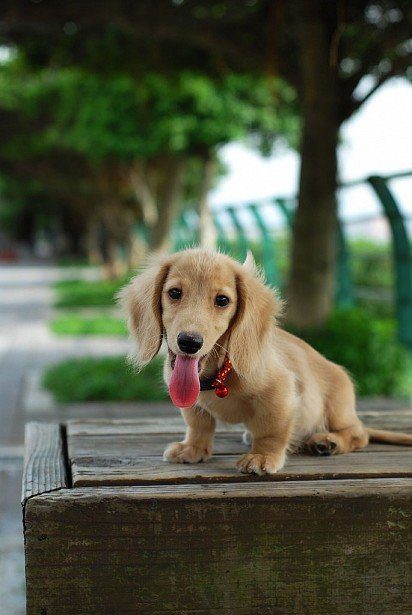
Despite their small size and original appearance, the dogs of this breed are distinguished by self-confidence and, in modern terms, the absence of complexes. Nature has left no room for servility in the heart of this dog. A dachshund will never forgive a rude disrespectful attitude towards himself, the reaction will be adequate. Disobedience, sabotage, doing out of spite – the dog uses all available means to assert its “I”. The basis for building good relationships can only be mutual respect.
Dachshund has proven itself as a companion. She can act balanced and even somewhat philosophical, but in the right atmosphere she becomes a cheerful, inventive minx. These dogs get along well with children, enjoying taking part in a variety of fun. In addition, representatives of the breed are very clean.
Many are struck by the discrepancy between the size of the dachshund and its voice. Powerful and loud barking can mislead not only a fox hiding in a hole, but also an uninvited guest who has come to the door of your house.
This dog is very fond of walking and will be happy to accompany you even on the most distant hikes.
Dachshunds are big connoisseurs of comfort. In the house, they choose for themselves the warmest and most comfortable corners, they like to relax, climbing under the covers or on the knees (or even on the neck) of the owner. They gladly accept caresses from household members.
The character of the dachshund is an amazing combination of integrity, strength, tenderness and love for a person.
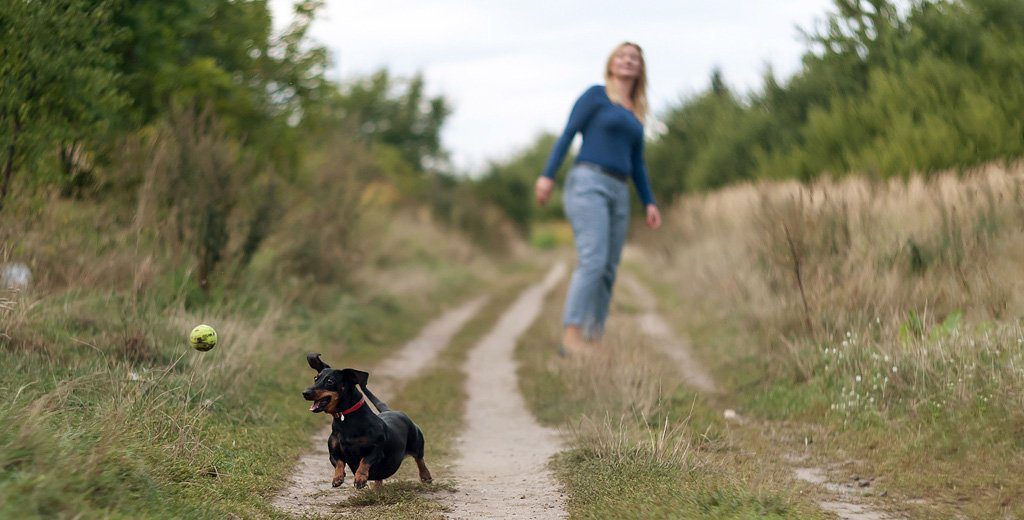
Education and training
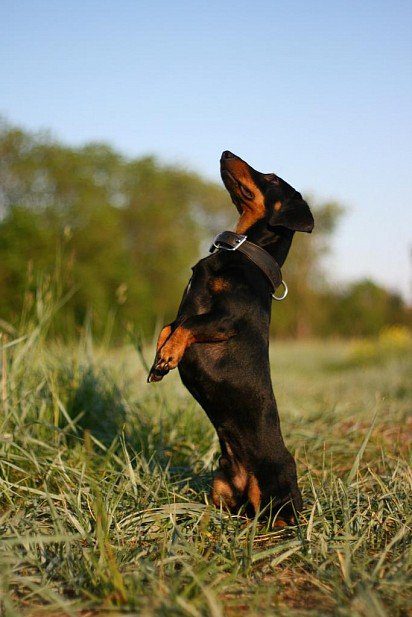
Dachshund is a smart and smart dog. She will quickly realize that permissiveness and connivance on the part of the owner is very cool, so you need to start raising your pet from the very first day you meet.
Training can wait a bit, but to accustom the dog to a nickname, diet, place, to explain to the baby “what is good and what is bad”, you need to immediately. Success in education can be achieved only on the basis of establishing close contact and mutual understanding with the animal.
Teaching a puppy to a nickname is easy. Calling by name, caress him, treat him with something tasty. Do not forget to encourage if the animal, reacting to its name, runs up to you. Little dachshunds are very cute, and you will have to show a certain firmness of character, accustoming to the place, because you really want to take this miracle to your bed or let him lie on an armchair. It will be almost impossible to wean a dachshund from such behavior, so it is better to stop such attempts immediately, gently and carefully each time taking the dog to its rug, while repeating the command “Place!”. Do not be afraid to clearly and understandably express your displeasure at the puppy’s misbehavior. The main thing is that your “Fu!” sounded to the point.
Dachshunds are very clean, so it is not difficult to teach a baby to urinate in a tray. You just need to take the puppy to the toilet in time (after sleep, after eating, or if the dog begins to behave restlessly). It is clear that he must stand in a specific place. When walks on the street begin, the tray can be removed. At the same time, attempts – especially successful ones – to go to the toilet in the apartment are assessed negatively (by no means punishing), and the same actions on the street are strongly encouraged.
It is very important in raising a small dachshund to adhere to the regimen in feeding, playing, walking.
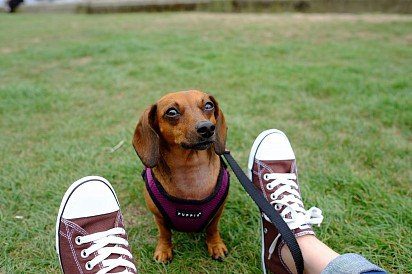
Dachshunds are intelligent dogs and are highly trainable. Training takes place on the principle of “from simple to complex”. Achieve the implementation of the basic commands “Sit!”, “Next!” or “Lie down!” it will be easier if you manage to interest your pet. The choice of method largely depends on the temperament and character of the puppy. Considering that dachshunds are real gourmets, training, where a favorite treat is used as a reward, gives good results.
Dachshund is a dog that by its nature actively reacts to external stimuli, so it is important to move your activities outside from the age of three months so that the baby gets used to extraneous noise and learns to respond only to your commands.
The training process should not contain any elements of violence. If the dog is tired and ignores you, reschedule the class.
Dachshund training is a lot of fun, and how far you want to go in the process is up to you. In principle, you can teach your pet almost all the skills and abilities that a dog’s mind can do.
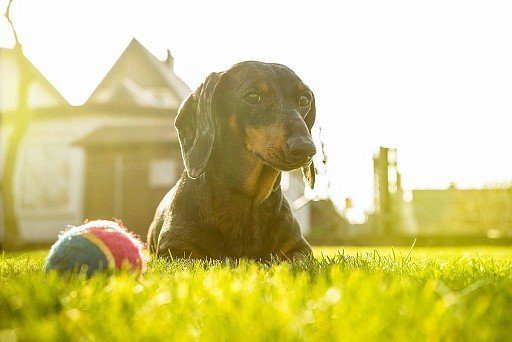
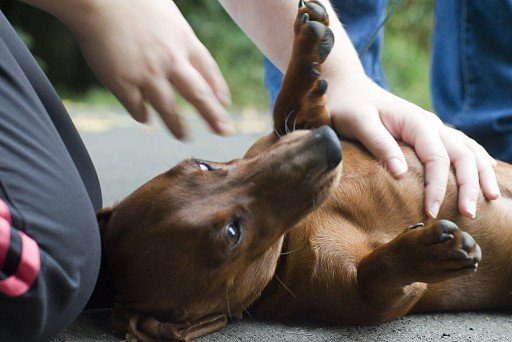
Care and maintenance
The dachshund is great for home keeping, and caring for it will not require any undue effort from you.
Before bringing a puppy into the house, it is necessary to carry out certain preparatory work, namely:

- carefully inspect the apartment and remove all household chemicals, indoor plants in places inaccessible to the dog, pack free-lying electrical cords in special boxes;
- mop the floor and hide all shoes;
- prepare places for feeding and resting the dog, buy all the necessary accessories;
- stock up on moisture-absorbing diapers and purchase a special tray (with or without a column). Dachshunds (especially small ones) have very active metabolic processes, and these items will definitely come in handy.
You will also need a nail cutter, a leash up to 5 meters long, products for bathing, caring for the eyes and ears of the animal.
The mat for the dachshund should be placed in a warm, cozy place, away from drafts and heaters. A soft flannelette blanket is best, covered with a sheet that can be washed as it gets dirty.
Basic rules for caring for a dachshund.
- For bathing, use specially designed shampoos. The frequency of water procedures is once every three to four months, not more often. Bathing is not recommended for small (up to six months) puppies. Washing dirty paws after a walk does not count.
- Be sure to trim your baby’s nails once every two weeks. An adult dachshund grinds them down during walks, and she may need such manipulation about once a quarter.
- Examine the eyes and wipe with a clean cloth soaked in warm water, removing the accumulated secret.
- Ears, as they get dirty, are cleaned with a cotton swab dipped in a weak solution of hydrogen peroxide.
- Smooth-haired representatives of the breed can be wiped with a terry towel or mitten. Long-haired dachshunds need to be combed systematically with a special brush.
- Clean your dog’s teeth regularly. This is the best prevention against the appearance of tartar and possible inflammation of the gums.

Important! The owners of these cute dogs should know that:
- dachshunds should not be allowed to jump down even from a small height;
- it is forbidden to take puppies by the scruff of the neck. When lifting the baby, take it under the chest with one hand, and support the hind legs with the other. To avoid injury to the elbows, do not lift the puppy under the paws;
- small children should not be allowed to carry a puppy in their arms – they simply may not hold it;
- as playmates, it is better to choose dogs that are suitable in size for your dachshund;
- do not take the puppy outside until all the necessary vaccinations have been received.
It is very important not to overfeed the animal. Excess weight is the enemy of the dachshund, as it creates an excessive load on the spine.
It is undesirable to use dry food for a puppy. This dog is not so large, so as not to be able to organize a balanced diet from natural products.
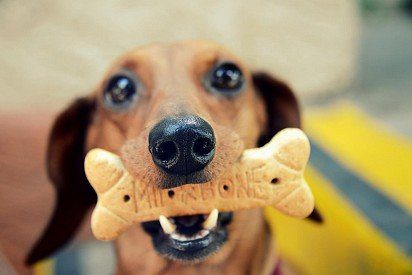
The dachshund’s menu must include the following products: low-fat cottage cheese, cereals (hercules, rice, buckwheat), which can be boiled in meat broth or pieces of meat (beef, lamb, chicken or turkey meat) can be added to the dish, although for puppies milk will be preferable porridge. Vegetables are also useful in the diet, twice a week you can give eggs to dachshunds, mixing and grinding them with cottage cheese. It is quite acceptable to give fish (sea and boneless) once or twice a week. But milk in its natural form will not bring benefits to the dog – it is simply not absorbed by the animal’s body.
Do not forget about mineral supplements, especially powdered clay, which is very useful for dachshunds.
Food from our table, sweets, spicy and spicy dishes, the dog does not need to be offered.
Dry mixes are best for an adult dog. Premium feed in this case is a completely acceptable alternative to a natural diet.
Dachshund health and disease
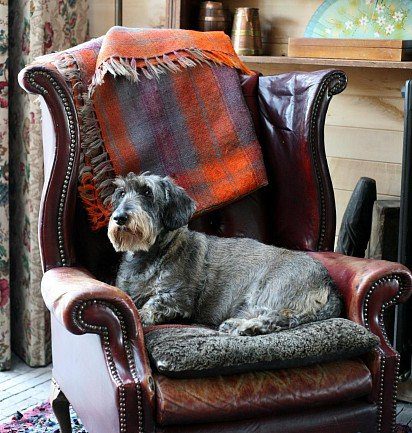
Canine diseases, which are typical for most breeds, can manifest themselves to some extent in dachshunds, and the methods of their treatment are quite traditional and typical. However, there is one “but” that should please the future owner – these pets, in principle, very rarely get sick. And this is an indisputable fact.
There are two diseases that are found only in representatives of this breed. The first is a disease called the swimmer effect. It occurs at an early puppy age and outwardly manifests itself in the fact that one-month-old puppies cannot rise to their feet in any way and move by crawling, making “swimming movements” with their paws. In most cases, this is a transient condition that does not affect the health of grown dachshunds in any way – they stand on their limbs and walk perfectly. However, the negative development of the disease, although rare, does occur. As a preventive measure, it can be recommended not to overfeed babies and make sure that they are not on slippery surfaces, where it is difficult for their still weak legs to find support.
The second disease, which belongs to the category of hereditary, poses an incomparably greater threat to the life of the dog. We are talking about dysplasia of the intervertebral discs. A fairly high incidence of this disease is associated with the characteristic structure of the body of the dachshund. Problems with the intervertebral discs can lead to infringement of the body of the spinal cord, deformation of the nerve trunks and, as a result, paralysis. Statistics show that the most critical age for the onset of the disease is 5-7 years, although earlier cases of diagnosing this disease are also known. In this regard, it is very important to strictly control the intensity of physical activity and properly feed the animal, in no case allowing weight gain. This will greatly reduce the load on the spine.
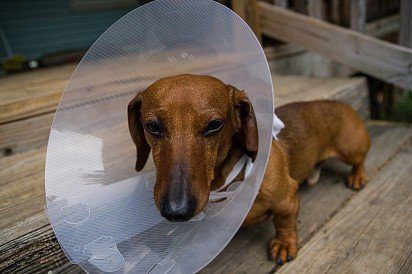
Diseases that are transmitted in dachshunds at the genetic level include papillary-pigmentary degeneration of the skin. Against the background of a violation of the secretion of the sebaceous glands, the integuments begin to thicken, become covered with age spots. Characteristic changes most often appear on the chest and abdomen of the dog, on the inner surface of the ears and in the armpits. The disease belongs to the category of rare, but when it occurs, effective treatment is not amenable.
There are also known cases of seizures of idiopathic epilepsy in dachshunds, which are characterized by impaired coordination of movements of the hind limbs, and then the forelimbs, as well as vomiting. Attacks, lasting from 2-3 minutes to half an hour, pass on their own. Outside intervention is not required. Most often, such phenomena were observed in animals of two to three years of age.
All of the above diseases are classified as hereditary, and it is impossible to completely protect the dog from their appearance. Due to proper care, attentive attitude to the condition of the dachshund, risks can be significantly reduced.
We should also not forget the therapeutic and preventive measures of the general plan. Timely vaccination, deworming, periodic examinations at the veterinarian will be the key to good health for your pet.
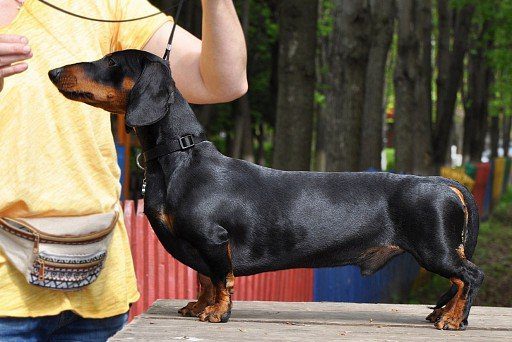
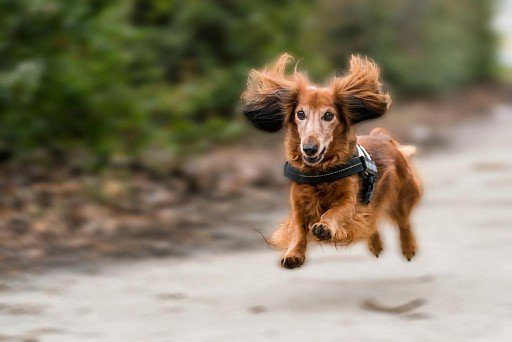
How to choose a puppy
If you decide to start a dachshund, then you need to start choosing a puppy even before he is born.
First of all, you should decide whether you want to have a working or decorative dog. It depends on where you should go – to the exhibition or in the field to assess the qualities of the parents of your future pet.
Well, if you have the opportunity to observe how a pregnant bitch is kept. In many ways, the quality of a puppy depends on the conditions of intrauterine development.
It will also be useful to make inquiries about the breeder, especially if you are buying a baby not from a nursery, but from a private individual.
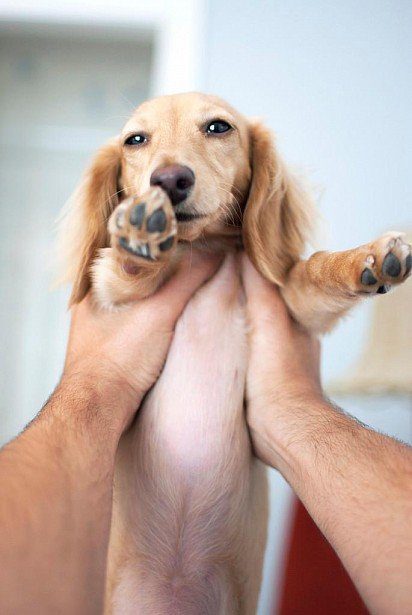
So the puppies were born. You will pick up your new friend at the age of one and a half to two months. It is advisable to agree in advance with the breeder on the cost of the animal. It is important to decide in advance the question of whether you will choose a dog yourself or a breeder will find it for you.
When choosing your own, pay attention to the following points:
- the puppy should not have dewclaws – they are removed in the first days of the baby’s life;
- the tail of a small dachshund is smooth to the touch and quite mobile without the slightest sign of any kind of deformation. Already by the age of one month, you can see whether the tail will be straight (in accordance with the standard) or will begin to twist into a ring;
- in a four-week-old puppy, it is already possible to assess the correctness of the bite, but the likelihood of such a defect as double incisors cannot be predicted – you will have to wait for a complete change of teeth;
- the presence of an umbilical or inguinal hernia is not difficult to determine visually. This is not dangerous, but since you still have to operate on the baby, you can talk with the owner about lowering the price;
- watch how the puppy moves. Support when walking should be on the paw pads. Any deviations in gait, sluggish hind legs, waddling back can be signs of serious problems with the musculoskeletal system.
As for the color of the dachshund: it will fully appear only by the year, but some patterns should be taken into account.
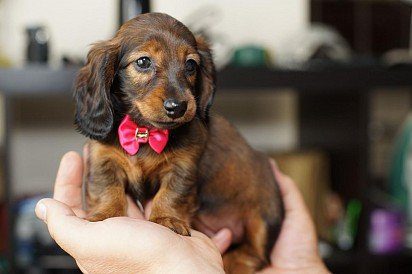
- Red puppies will brighten. But their nose and claws should be black. The assurances of the breeder that the light nails and nose will eventually become dark and will meet the breed standard is a deliberate lie. In tone with the main color, the lobe and claws are allowed only in brown dachshunds.
- Tan in black and tan puppies should be as pronounced as possible, on the chest it resembles the shape of a butterfly with well-defined edges and a black bridge.
- Examine the puppy for white spots or marks. If they are hardly noticeable, then, perhaps, they will disappear with age. Remember that the white coat of a dachshund is a disqualifying sign, and your pet will not be allowed to breed and participate in exhibitions.
The condition of the coat, ears, eyes of the animal is assessed traditionally (shine, no discharge and no unpleasant odor). Dachshund puppy should be moderately well-fed and heavy enough. It is not fat (due to the belly fattened on carbohydrates), but heavy. A healthy baby is playful and active, shows a keen interest in the surrounding space, has a good appetite.
Dachshunds show individual character traits very early, so take a closer look at the dog with what temperament you would like to see at home.
Photo of dachshund puppies
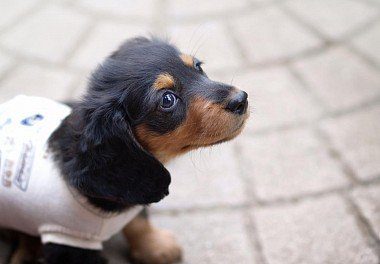
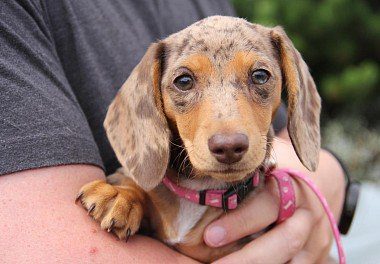
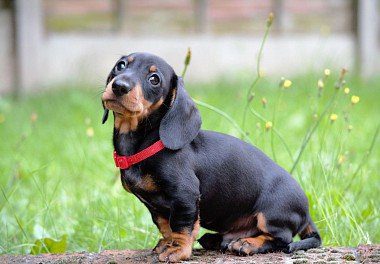
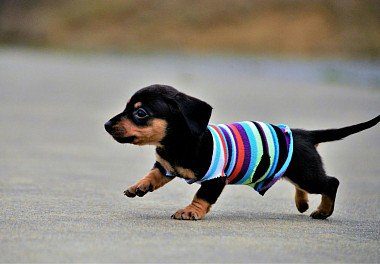
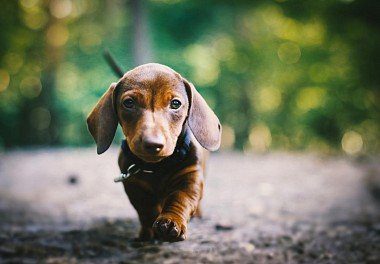
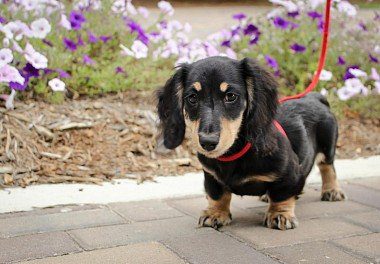
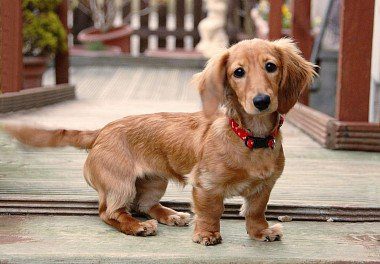
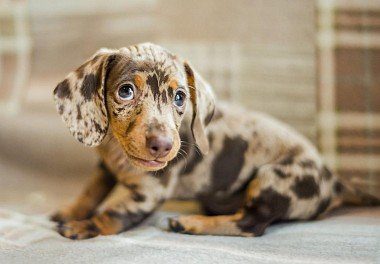
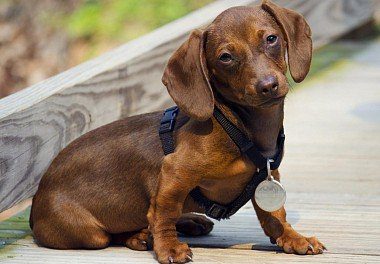
How much is the Dachshund
If you decide to buy a dachshund puppy for the soul and do not plan to participate in exhibitions, trials or hunting, then the option of buying online or even in the market may be suitable for you. The price in this case will not be too high – only a few thousand rubles. As a rule, such dachshunds do not have documents, and you consciously assume all future risks in terms of your pet’s health, compliance of its appearance with the requirements of the standard. It is possible that today’s cute puppy, when he grows up, will turn out to be either not quite, or not at all a dachshund either in character or in appearance.
The price for a “legalized” puppy, which has all the necessary documents, has been vaccinated appropriate for its age and meets the requirements of the standard, will start from the amount of 350$. Do not be surprised at such a serious figure. Even this price, in most cases, rarely covers the costs of a responsible breeder associated with breeding, providing proper care for the puppy bitch and the babies that have appeared, and completing all the necessary documents.



